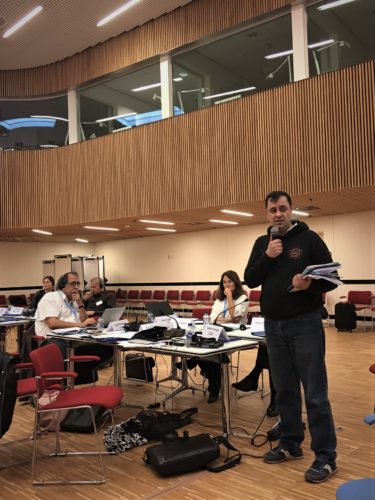On September 25-26, the national HIV programs managers of eastern European, central Asian and non-European Union/European Economic Area (EU/EEA) countries got together for a regional meeting held at the WHO European Office in Copenhagen.
 Vladimir Zhovtyak, ECUO President, as a representative of international PLWH community, participated in an open discussion session ”Sustainability of HIV prevention, treatment and care for key populations programs”:
Vladimir Zhovtyak, ECUO President, as a representative of international PLWH community, participated in an open discussion session ”Sustainability of HIV prevention, treatment and care for key populations programs”:
–” EECA is the only region that has not reached the sixth Millennium Development Goal for halting the HIV/AIDS epidemic. We can observe increase of new HIV infections and AIDS deaths in EECA. It says that, unfortunately, the efforts and actions taken at the country level by governments, NGOs and the international community to stop the HIV / AIDS epidemic are not enough. The patient’s satisfaction with HIV services also leaves much to be desired. For example, community in Ukraine conducted a study among patients who have been treated for at least 1 year. The results showed that patients are not satisfied with the quality of services they receive, both in medical government institutions and NGOs. We have received very revealing data that require to revise existing treatment programs and include innovative approaches (note: see the study details in the video). Today, for the whole region is important to realize that we must give patients those drugs that can provide quality and comfort of life. If PLWH are committed to treatment, HIV will not spread further. Only in this way can we stop the HIV/AIDS in our countries …”
– “… As EECA community of PLWH representatives, now we are not asking, but we require the inclusion of innovative integrase inhibitors in first-line regimens. We demand to heed the voice of the Executive Director of UNAIDS and WHO, especially as there is a Medical Patent Pool and manufacturers are ready to reduce prices … “
“… Today, EECA needs a single response to all three diseases: HIV, TB and viral hepatitis. We need one regional program and a synchronized action plan that will respond to all three epidemics together. An illustrative and effective example of efforts synchronization is our regional program “Partnership for Equitable Access to HIV Care Continuum in EECA”, that we implement in conjunction with key regional associations and communities’ networks. “
Natalia Khilko (ITPCru) in her speech highlighted the importance and urgency of expanding access to innovative drugs. previously called on all stakeholders of EECA by ECUO team its Positional Statement and the Access to Treatment Concept. Natalia also said that several studies on prolonged forms of HIV treatment are now underway, and these are exactly the drugs that can completely change the lives of patients in the next few years. They will change prevention, treatment, and adherence. We can’t miss the opportunity to make these [innovative] drugs affordable so they could really help make the situation better for us.
The panel discussion video, including speeches of all participants of the block “Sustainability of HIV prevention, treatment and care for key populations,” is available below:
Elena Vovk (WHO), Naira Sargsyan (UNAIDS) facilitated discussions on the “Sustainability of HIV prevention programs,” Vladimir Zhovtyak (ECUO), Michael Krone (AIDs Action Europe), Anna Zhakovich (AHF), Serhii Riabokon (Ukraine) and Natalia Khilko (ITPCru) took part in discussions with the expert participation of Michel Kazatchkine, UN Secretary General’s special envoy for HIV / AIDS in EECA, Vinay Saldanha, Regional Director for Eastern Europe and Central Asia, UNAIDS.
It should be noted that at a meeting at the WHO European Bureau next questions were discussed: prevention measures aimed at increasing effectiveness of HIV interventions in WHO European Region; scaling up HIV testing and related increase in treatment access; scaling up the HIV treatment of HIV and linking to care services in order to improve the treatment perception; strengthening HIV surveillance and monitoring as a basis for decision-making, as well as financial sustainability and innovative interventions to accelerate the national programs response.
